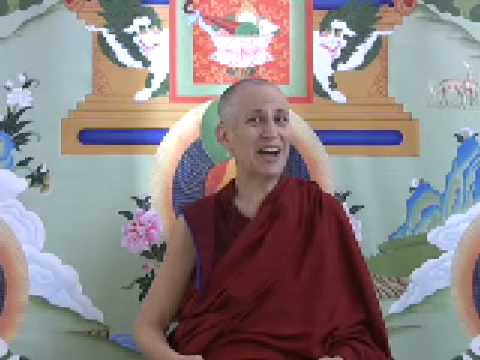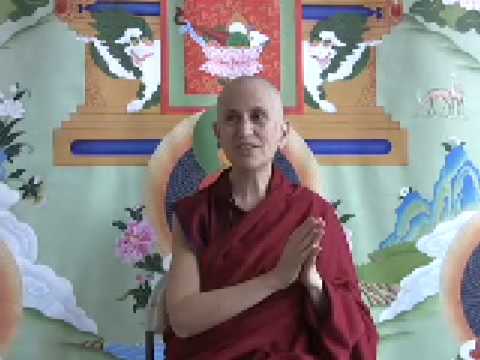Verse 26-3: Reducing jealousy and anger
Part of a series of talks on the 41 Prayers to Cultivate Bodhicitta from the Avatamsaka Sutra (the Flower Ornament Sutra).
- Imagining good qualities in others to reduce anger or jealousy
- Using this verse when the mind is very judgmental
- The benefit of seeing others in beauty
41 Prayers to cultivate bodhicitta: Verse 26-3 (download)
Just to review, Verse 26 is,
“May all beings be filled with good qualities.”
This is the prayer of the bodhisattva when seeing a filled container.
When you see containers that are filled. You see the water jugs, those beings are getting filled. The water bottle over there, they’re really filled. It’s nice to generate that kind of thought in terms of other beings because when we want them to be filled with good qualities we can’t at the same time be jealous of them. So if you’re suffering from jealousy, replace that with the thought of, “May all beings be filled with good qualities.” This is called “factor substitution” in the Pali system. That’s the way of getting rid of manifest affliction, is you replace it with another kind of thought which is the exact opposite of it.
That’s what Verse 26 is for, to reduce jealousy. It’s also to reduce anger. We can’t want other beings to be filled with good qualities if we’re angry at them, because when we’re angry we want them to suffer. Also when we’re angry, we think of them as having no good qualities whatsoever. That’s clearly a distorted perception, what we call nam-tok, or proliferation, conceptualization. So thinking, “May they be filled with good qualities,” helps us to see that they have good qualities and to wish them more. And we always feel much better when we wish others well, don’t we?
This one here, “May all beings be filled with good qualities,” use it when your mind is being very judgmental. When you’re getting into that newscaster mind or sportscaster mind, “Oh they did this and they did that. Look at them running down the five yard line like an idiot.” The mind is just always commenting in a critical way about how others look, what they do, what they’re not doing, how they dress, what they think, how they’re acting, their manners, all these kinds of judgements and opinions. To stop them, to just cut them off and think, “May all beings be filled with good qualities,” and then think of these beings, how happy they would be if their good qualities which they already have were nurtured and expanded and enhanced.
That helps us to see others in a completely different way. Of course when we see them in that way, then we see them in beauty, then it’s easy to cultivate love and compassion and bodhicitta. And it frees us from all these proliferations. This is the thing I’ve been working on yesterday and today, kind of all these proliferating, distorted conceptions that we think are reality. Some of the really gross ones we’ll notice and say, “Oh, I’m thinking in the wrong way,” but it’s hard to get rid of them anyway. Then there are other ones, even though we know we’re thinking in the wrong way, it’s like we’re also so attached to that thought, so ego-invested in it that we can’t let it go.
Then there are a whole other bunch of conceptualizations that are operating at a much more subtle level that we don’t even realize we have. Like the ones we’ve been discovering as we’ve been talking about karma and all. We were talking about, “I’m evil if I experience happiness and happiness is bad. My body is evil.” All these kinds of things that we walk around with, that influence our thoughts, and influence our behavior, and influence our feelings. We’re not even aware that we have these kinds of conceptions in our mind, because they’re there and we think they’re reality, that things really are like that. That drugs really are going to make you happy. Or whatever those muffins are, they’re really going to make us happy. Or whatever our thing is. “If that person would just stop clicking their mala in meditation sessions, then I would be happy.” [laughter] Oh, did I hit on something that just came up, this comes up every retreat. [laughter] I wonder who’s been doing that. [laughter]
Venerable Thubten Chodron
Venerable Chodron emphasizes the practical application of Buddha’s teachings in our daily lives and is especially skilled at explaining them in ways easily understood and practiced by Westerners. She is well known for her warm, humorous, and lucid teachings. She was ordained as a Buddhist nun in 1977 by Kyabje Ling Rinpoche in Dharamsala, India, and in 1986 she received bhikshuni (full) ordination in Taiwan. Read her full bio.


